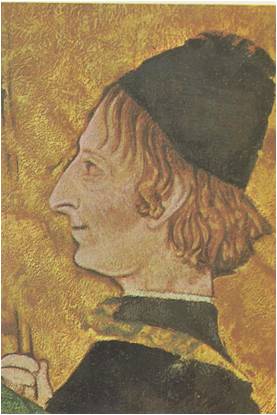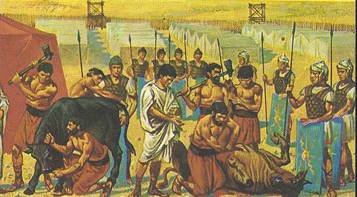One day in the fifteenth century, the Turkish potentate of Babylonia decided to send gifts to the greatest ruler in Italy. He consulted his counselors and men who had traveled widely in Europe, asking them who best deserved this honour. They agreed that one Italian court outshone the rest and that his court must surely be the home of Italy’s mightiest sovereign. They did not name Milan, the home of the proud Sforza, nor Florence, the city of the clever Medici. The most magnificent court in Italy, they said, was at Ferrara, the capital of the dukes whose family name was d’Este and to Ferrara the Turkish potentate’s ambassadors carried the presents. Ferrara was small, a mere toy state in comparison to Milan or Florence. Actually, it was not an independent state at all. Like several of its neighbours in central Italy, Ferrara had for centuries belonged to the Church. Its duke paid an annual tribute to the pope for the privilege of governing his family dukedom himself. Even so, the Turkish potentate’s advisers had made no mistake. No court in Italy could match the splendor of the court commanded by the dukes of little Ferrara. During the Renaissance, there were many such small cities that won fame. It all depended on their rulers — the ambitious dukes or counts or sometimes, commoners who had gained riches and power. With their money, they, too, hired fine artists, sculptors and architects; they, too, collected manuscripts and things of beauty. So the small cities were as much part of the new age as Florence or Milan. In that new age, Ferrara was a place of old fashioned grandeur. Its dukes, the d’Estes, had come to power in the last days of chivalry. In 200 years, the d’Estes had turned Ferrara into a …
Read More »The City of the World A. D. 117 – A. D. 138
ROME was no longer just a city — it was a world. In the reign of Hadrian, the blaring trumpets that announced the comings and goings of the emperor echoed in Spain, Syria and Britain as often as in Italy. Hadrian wanted to know what was going on in all of his empire. He wanted to inspect the troops and forts that held the frontiers and to judge for himself the wisdom of the governors he had sent to rule the provinces. He wanted to visit the towns and cities, to see their ancient buildings, to plan new buildings where they were needed and to build new towns in the frontier provinces. He wanted to meet the people. They were citizens of Rome, even though their homes were hundreds of miles from Italy and they had never seen the Forum. Hadrian’s journey through the empire took eight years. He followed the Roman roads and the sea routes Rome had freed from pirates, until he had visited every part of the world of which he was the sole, all-powerful ruler. He met many other travelers on the roads. Travel was easy now and safe. Rich Romans, imitating the emperor, had become eager tourists. They flocked to Greece; to them it was a quaint place out of another age. They studied its famous buildings, bought statues and pottery for souvenirs and paced out the old battlefields which they had read about in Plutarch’s histories. In Egypt, they went shopping in Alexandria, still handsome and a bustling center of trade. They rode in elegant comfort on sightseeing barges that took them up the Nile to Memphis and Thebes. There they admired the oldest buildings known to man and scratched their initials in the stonework. This eastern area was Rome’s “Old World.” It had …
Read More »The City of Augustus 29 B. C. – A. D. 14
IN 29 B.C. the gates of war were closed. Rome was at peace. Senators and the people of the mob-men who had hated and fought each other through long, bitter years — stood side by side in the Forum while the great doors of the temple of Janus were slowly pushed shut. That had happened only twice before in the history of the city. The crowd in the Forum cheered the peace and they cheered Octavius, their new ruler. He was no longer the young man who had rushed to Rome after the murder of his uncle, Caesar. Seventeen years had passed since then — seventeen years of hard campaigning, of friends who became enemies and of alliances that were broken. He was still handsome and his sharp eyes could still look through a man. He walked with a new dignity that won him the respect of the people and Senate alike. Wherever he went, cheering crowds followed him. His friends told him that he could make himself the king of Rome. Octavius remembered what had happened when Caesar had thought of becoming a king. Caesar had proved that one man with an army could do what the bickering Senate and the mob could not do: he could run the empire. A world with millions of people in it was still like the smallest Roman family; it worked best with only one pater familiar. Octavius meant to be that all powerful father of Rome, but he intended to let the Romans think that they had asked him to be it. He celebrated his Triumph with processions that went on for three days. With the treasures he had won in Egypt, he bought land to give to his soldiers. He ordered the building of a splendid temple to Apollo, as he …
Read More »


